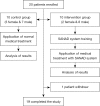Evaluation of the effectiveness of mobile diabetes management system with social networking and cognitive behavioural therapy (CBT) for T2D
- PMID: 30221168
- PMCID: PMC6131530
- DOI: 10.21037/mhealth.2018.06.05
Evaluation of the effectiveness of mobile diabetes management system with social networking and cognitive behavioural therapy (CBT) for T2D
Abstract
Background: In the Saudi Arabia region there are no previous studies related to the use of social networks combined with the management of mobile diabetes. In this sense, the aim of this feasibility investigation is to evaluate the application and utility of the SANAD system (Saudi Arabia Networking for Aiding Diabetes) to support Saudi type 2 diabetes adult patients.
Methods: Twenty patients from a clinic in Saudi Arabia-Dammam were recruited to use the SANAD system. The study design was a randomized controlled trial (RCT) with two groups: an intervention group using SANAD system and a control group using conventional diabetes treatment. Glycated hemoglobin (HbA1c), diabetes knowledge test (DKT) and Self-efficacy Scale (SES) were documented.
Results: Nineteen patients completed the study. Mean baseline HbA1c (%) was 8.14 (SD 1.20) and decreased to 7.54 (SD 0.96) after the SANAD intervention process [mean (SEM) decrease 0.600 (0.102)]. A paired-samples t-test showed this change to be significant (P=0.000). Linear regression analyzed each study group separately, and revealed that age significantly predicted change in HbA1c (%) in the intervention group, with older age (i.e., 41-50 years) associated with higher HbA1c (%) at 6 months, as compared with baseline values (β=0.865, t=3.67, P<0.05). The mean diabetes knowledge score prior to the intervention (baseline) was 12.11 (SD 2.09), which rose to 14.56 (SD 1.59) afterward. This increase [mean (SEM), 2.44 (0.530)] was shown to be significant using the paired-samples t-test (P=0.002). Linear regression demonstrated that age, gender, and educational level were not related to increased diabetes knowledge in each study group. The mean self-efficacy score prior to the intervention (baseline) was 5.17 (SD 0.45), which rose to 6.17 (SD 0.39) afterward. This increase [mean (SEM), 0.944 (0.192)] was shown to be significant using the paired-samples t-test (P=0.001). Linear regression demonstrated that age, gender, and educational level were not related to increased self-efficacy in each study group.
Conclusions: This study demonstrates that using of SANAD system is acceptable, and feasible in supporting diabetes care in Saudi Arabia. This study is the first in Saudi Arabia to demonstrate similar benefits of using this technology on social diabetes and management. A national clinical trial is needed to assess precise benefits of self-care and knowledge.
Keywords: Saudi Arabia; diabetes; mHealth.
Conflict of interest statement
Conflicts of Interest: The authors have no conflicts of interest to declare.
Figures
References
-
- 5th Edition of the Diabetes Atlas released on World Diabetes Day | International Diabetes Federation [Internet]. [cited 2015 Jan 01]. Available online: http://diabetesatlas.org/resources/2017-atlas.html
-
- Al-Hazzaa HM. Prevalence of physical inactivity in Saudi Arabia: a brief review. East Mediterr Health J 2004;10:663-70. - PubMed
LinkOut - more resources
Full Text Sources
Other Literature Sources


